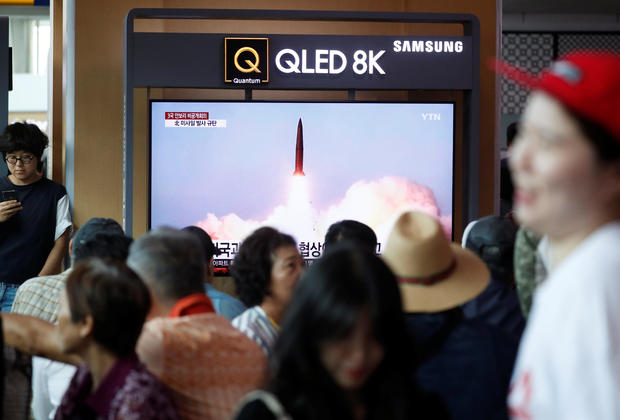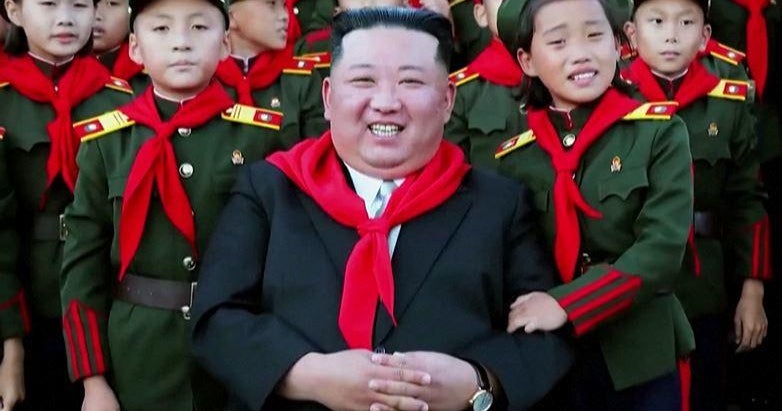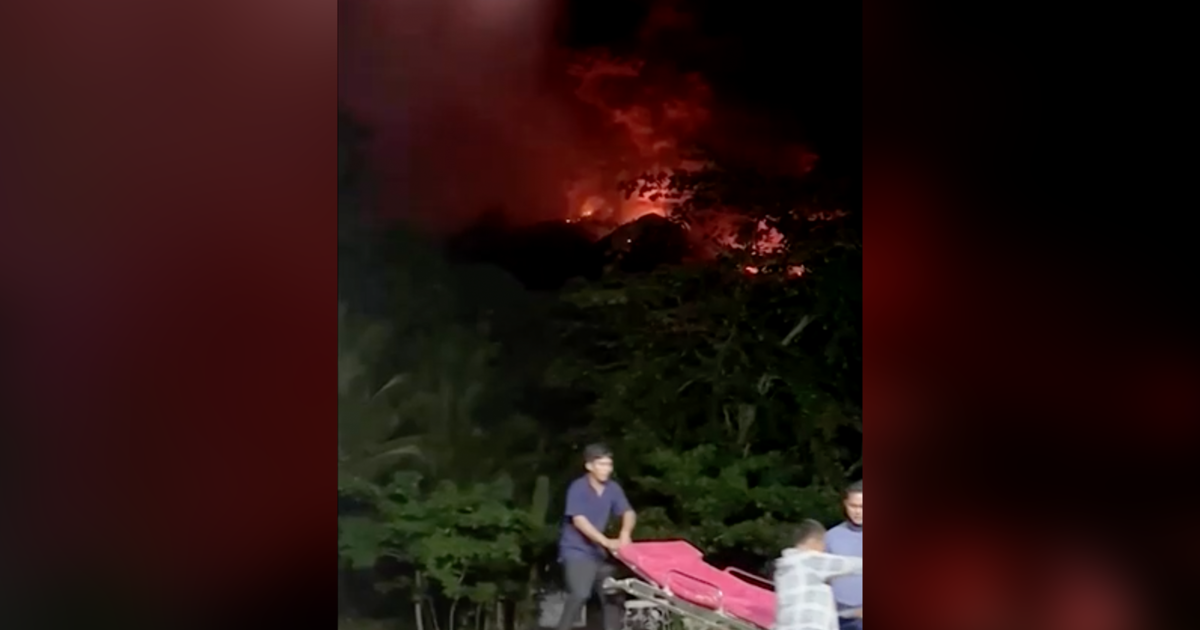North Korea fires projectiles for third time in eight days, South says
Seoul, South Korea -- North Korea fired what appeared to be short-range ballistic missiles into the sea off its eastern coast twice on Friday, South Korea's military and presidential office said. It was Pyongyang's third round of weapons tests in just over a week.
The increased testing activity is seen as brinkmanship aimed at increasing pressure on Seoul and Washington over stalled nuclear negotiations. North Korea also has expressed frustration over planned U.S.-South Korea military exercises, and experts say its weapons displays could intensify in coming months if progress on the nuclear negotiations isn't made.
By test-firing weapons that directly threaten South Korea but not the U.S. mainland or its Pacific territories, Pyongyang may also be trying to dial up pressure on Seoul and test how much of the North's bellicosity Washington will tolerate without actually scrapping the nuclear negotiations.
Seoul's Joint Chiefs of Staff said the launches were conducted at 2:59 a.m. and 3:23 a.m. from an eastern coastal area and said the projectiles flew 137 miles on an apogee of 15 miles and at a max speed of Mach 6.9.
South Korea's presidential office, which held an emergency meeting presided over by chief national security adviser Chung Eui-yong to discuss the launches, said the South Korean and U.S. militaries shared an assessment that the projectiles were likely newly developed short-range ballistic missiles the North has been testing in recent weeks. However, the office said further analysis was needed because the projectiles showed similar flight characteristics with the weapons that the North test fired on Wednesday and described as a new rocket artillery system.
Kim Eun-han, a spokesman for South Korea's Unification Ministry, said the Seoul government expressed "deep regret" over launches, which it believes could hurt efforts for peace on the Korean Peninsula.
Japan's Defense Ministry said it was analyzing the launch and that the projectiles did not reach Japanese territorial waters or its exclusive economic zone.
In Bangkok, Thailand Friday, Secretary of State Mike Pompeo told reporters, "You should never doubt what we may be communicating to the North Koreans. There are conversations going on, goodness, even as we speak. But the diplomatic path is often fraught with bumps, tos and fros, forward and backward.
"We are still fully committed to achieving the outcome that we have laid out – the fully verified denuclearization of North Korea – and to do so through the use of diplomacy."
Pompeo was attending an Asian security conference, the annual Association of Southeast Asian Nations (ASEAN) forum that has served in the past as a venue for talks between Washington and Pyongyang. He'd said he hoped Pyongyang would send its foreign minister this year, but it didn't happen.
Separately, the chief U.S. envoy for North Korea met on the conference sidelines Friday with his Japanese and South Korean counterparts.
Stephen Biegun said he had "good talks" with Do-hoon Lee of South Korea and Kenji Kanasugi of Japan on the prospects for resuming stalled denuclearization negotiations with the North.
The North fired short-range ballistic missiles on July 25 and conducted what it described as a test firing of a new multiple rocket launcher system on Wednesday.
Amid the stalemate in nuclear negotiations with the United States, North Korea has significantly slowed diplomatic activity with the South while demanding Seoul turn away from Washington and proceed with joint economic projects that have been held back by U.S.-led sanctions against the North.
The North's new launches came as the United Kingdom, France and Germany - following a closed U.N. Security Council briefing Thursday - condemned the North's recent ballistic activity as violations of U.N. sanctions and urged Pyongyang to engage in "meaningful negotiations" with the United States on eliminating its nuclear weapons.
The three countries also urged North Korea "to take concrete steps toward its complete, verifiable and irreversible denuclearization" and said international sanctions should remain in place and be fully enforced until its nuclear and ballistic missile programs are dismantled.
U.S. officials have downplayed the threat of the launches to the United States and its allies.
However, the North's recent weapons demonstrations have dampened the optimism that followed President Trump's impromptu summit with North Korean leader Kim Jong Un on June 30 at the border between the two Koreas. The leaders agreed to resume working-level nuclear talks that have been stalled since February, but there have been no known meetings between the two sides since then.
The North has claimed the United States would be violating an agreement between the leaders if it goes ahead with its planned military exercises with South Korea and said it will wait to see if the August exercises actually take place to decide on the fate of its diplomacy with Washington.
Mr. Trump said on Thursday he wasn't worried about the weapons recently tested by North Korea, calling them "short-range missiles" that were "very standard."
On Thursday, North Korean state media said leader Kim Jong Un supervised the first test firing of a new multiple rocket launcher system Wednesday that he said would soon serve a "main role" in his military's land combat operations.
South Korea's Joint Chiefs of Staff had assessed that activity as a short-range ballistic missile launch, saying the missiles flew about 155 miles, a range that would be enough to cover the metropolitan region surrounding capital Seoul, where about half of South Koreans live, and a major U.S. military base just south of the city.
On July 25, Pyongyang fired two short-range ballistic missiles that officials in Seoul said flew 370 miles and as high as 30 miles before landing in the sea.
North Korea said those tests were designed to deliver a "solemn warning" to South Korea over its purchase of high-tech, U.S.-made fighter jets and the planned military drills, which Pyongyang calls an invasion rehearsal. The North also tested short-range missiles on May 4 and 9.




